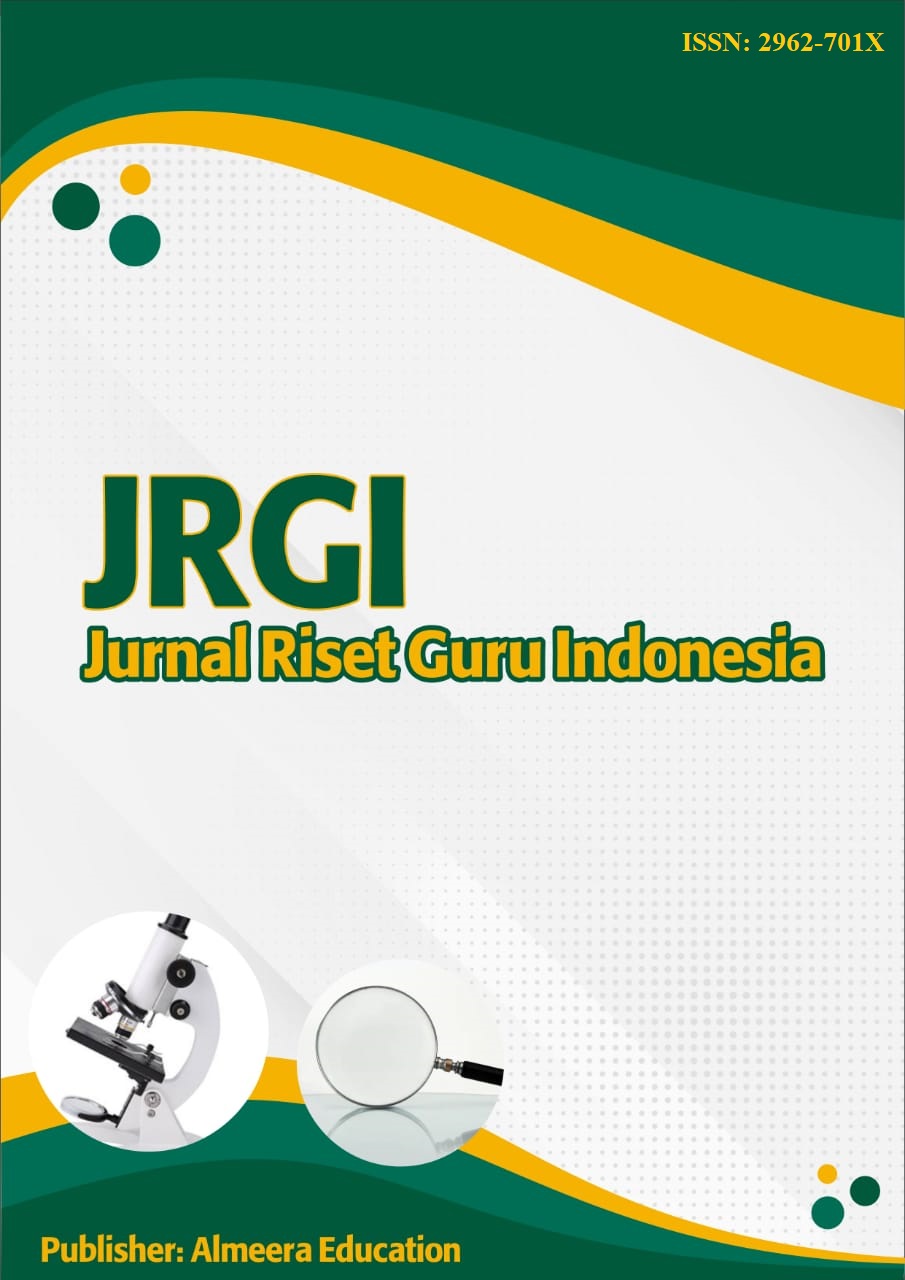IMPLEMENTASI KURIKULUM MERDEKA DALAM PEMBELAJARAN BAHASA INDONESIA: TANTANGAN DAN PELUANG DI ERA DIGITAL
DOI:
https://doi.org/10.62388/jrgi.v4i1.516Kata Kunci:
Independent curriculum, Indonesian language learning, digital eraAbstrak
Abstract. This study adopts a descriptive qualitative approach using a case study method. Data collection was carried out through in-depth interviews, participant observation, and document analysis to obtain a comprehensive understanding of the implementation of the Merdeka Curriculum in the Indonesian language learning process. The subjects involved in this study included Indonesian language teachers, students, and education personnel from various schools that have implemented the Merdeka Curriculum. The data analysis method in this study adopted the model developed by Miles and Huberman, which consists of three important stages: data reduction, data presentation, and drawing conclusions. To strengthen the validity of the data, the researcher applied triangulation involving various sources and methods. This study also considered various factors that influence, both supporting and inhibiting, the implementation of the Merdeka Curriculum. Based on the results of this study, it is clear that the implementation of the Merdeka Curriculum in teaching Indonesian has a beneficial effect on increasing student participation. In particular, the project-based learning method is a special attraction for students. In addition, the use of digital technology in this curriculum opens up enormous opportunities to enrich students' learning experiences. However, there are still some challenges faced, namely related to infrastructure readiness and the need for training for teachers. The results of the study revealed that schools with better infrastructure are able to implement digital-based learning methods with a higher level of effectiveness compared to schools that still face limitations in access to technology. In addition, online learning platforms have made a significant contribution to expanding access to education for students, although there are still some obstacles in assessing learning outcomes authentically.
Referensi
Alatas, M. A., Effendy, M. H., Desiana, A. Y., & Nisa, H. H. (2024). Implementasi Kurikulum Merdeka pada Muatan Lokal Bahasa Madura di MI Kabupaten Pamekasan: Pendekatan Ekologis dalam Pendidikan Karakter dan Budaya. GHANCARAN: Jurnal Pendidikan Bahasa Dan Sastra Indonesia, 363-375. iainmadura.ac.id
Hasna, M. (2024). Digitalisasi Pengelolaan Sekolah Dasar Negeri Kota Banjarmasin: Tinjauan Analisis SWOT Dalam Strategi Pengembangan Sekolah Digital. Jurnal Pendidikan Modern. stkipmodernngawi.ac.id
Hidayat, R. (2022). Penggunaan Teknologi Digital dalam Pembelajaran Bahasa Indonesia. Jakarta: Pustaka Edukasi.
Kemendikbudristek. (2022). Panduan Implementasi Kurikulum Merdeka. Jakarta: Kementerian Pendidikan, Kebudayaan, Riset, dan Teknologi.
Prihatini, A. (2022). Citra Kurikulum Baru: Kesiapan Guru dalam Menerapkan Kurikulum Merdeka. GHANCARAN: Jurnal Pendidikan Bahasa Dan Sastra Indonesia, 58-70. iainmadura.ac.id
Rohman, M. (2023). Tantangan dan Peluang Kurikulum Merdeka dalam Pembelajaran Bahasa. Yogyakarta: Media Literasi.
Sape, H. (2024). Pengaruh Platform Digital Terhadap Kemampuan Literasi Numerasi Siswa. Jurnal Penalaran dan Riset Matematika, 3(2), 73–80. https://doi.org/10.62388/prisma.v3i2.490
Saputra, A. A., & Stiawan, A. (2024). Kajian Review Kurikulum K13 dan Kurikulum Merdeka dalam Implikasinya Terhadap Pembelajaran di Masa Mendatang. SOSEARCH: Social Science Educational Research, 5(1), 1-17. unesa.ac.id
Sastradiharja, E. J., & Febriani, F. (2023). Pembelajaran Berbasis Projek (Project Based Learning) Dalam Meningkatkan Kreativitas Siswadi Sekolah Penggerak Smp Al Azhar Syifa Budi Cibinong-Bogor. Edukasi Islami: Jurnal Pendidikan Islam, 12(01). staialhidayahbogor.ac.id
Suyanto, T. (2021). Literasi Digital dalam Pendidikan Bahasa Indonesia. Bandung: Literasi Nusantara.
Syamsiar, H., Muzakki, M., Ratnaya, I. G., & Widiana, I. W. (2023). Evaluasi Kurikulum Merdeka Belajar Berbasis CIPP. Journal of Education and Instruction (JOEAI), 6(2), 536-544. ipm2kpe.or.id


